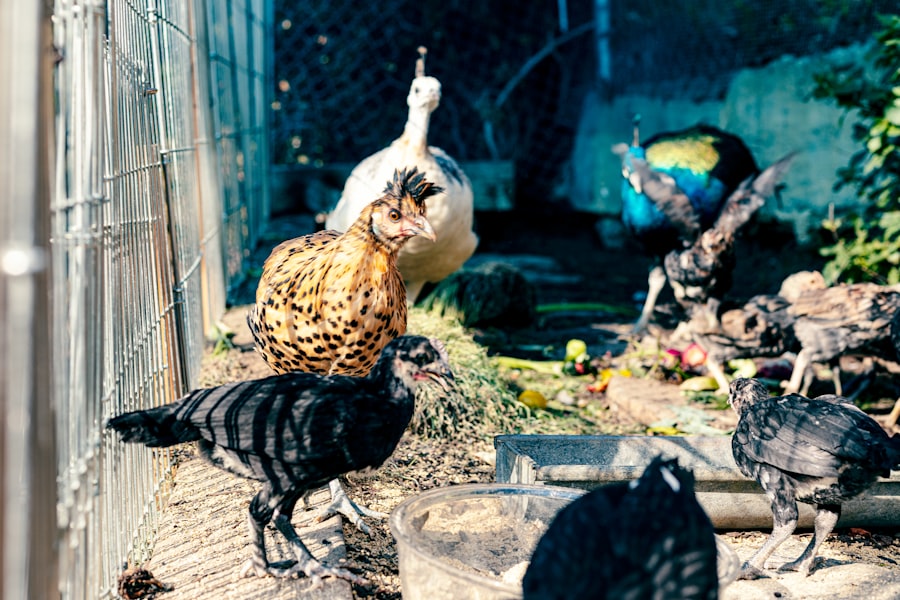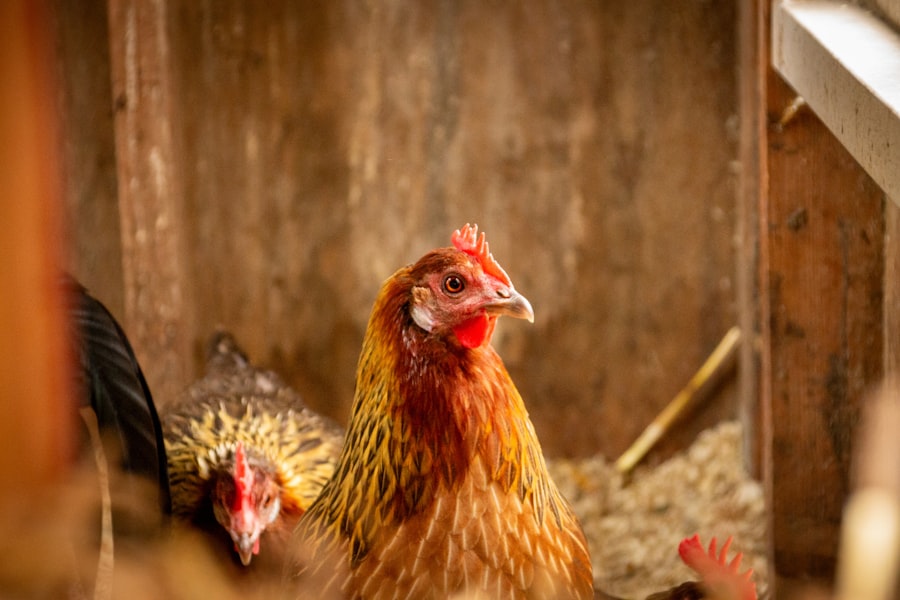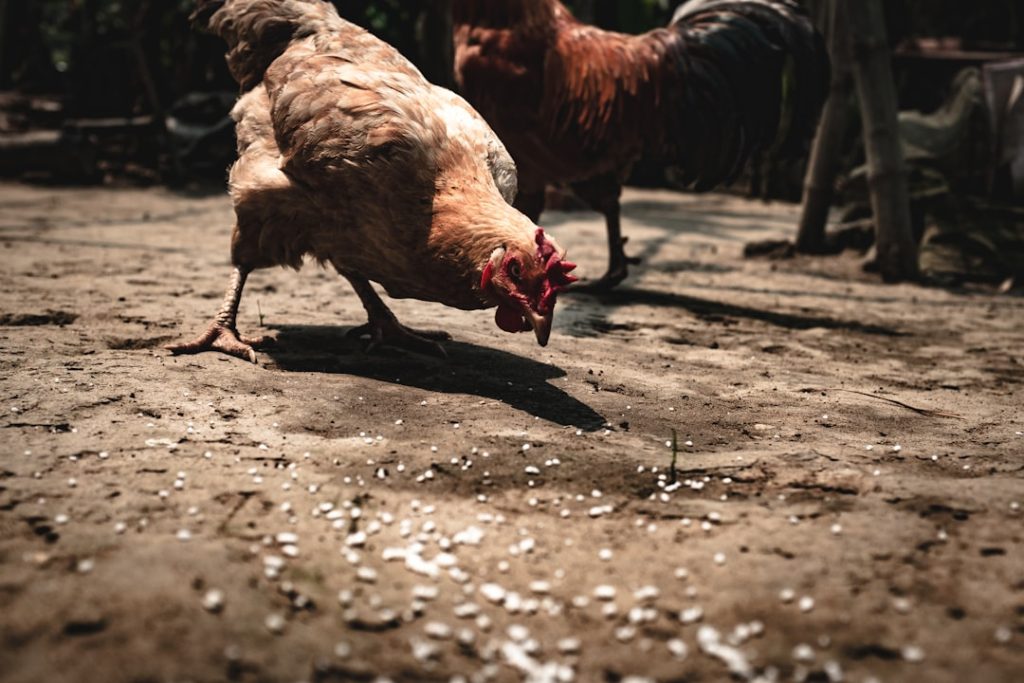When selecting a chicken breed for a backyard flock, several factors should be considered. Climate is a crucial consideration, as some breeds are better adapted to cold weather, while others thrive in warmer conditions. The intended purpose of the flock is also important, whether it’s for egg production or meat.
Some breeds are renowned for their egg-laying capabilities, while others are valued for meat production. The temperament of the breed is another significant factor, especially for families with children or other pets. The Rhode Island Red is a popular breed for backyard flocks due to its excellent egg-laying abilities and adaptability to various climates.
This breed is known for its friendly and docile nature, making it suitable for families. The Plymouth Rock is another well-regarded breed, also recognized for its egg production and amiable temperament. For those interested in meat production, the Cornish Cross is a common choice due to its rapid growth and high meat yield.
Ultimately, the ideal breed for a backyard flock depends on specific requirements and preferences. Thorough research is essential before making a decision to ensure the chosen breed aligns with the keeper’s needs and local conditions.
Table of Contents
- 1 Building a Coop
- 2 Feeding and Watering
- 3 Providing Proper Care and Maintenance
- 4 Handling and Socializing
- 5 Protecting from Predators
- 6 Health and Wellness
- 7 FAQs
- 7.1 What are the basic requirements for keeping chickens?
- 7.2 What type of housing do chickens need?
- 7.3 What do chickens eat?
- 7.4 How do you keep chickens healthy?
- 7.5 What are some common health issues in chickens?
- 7.6 How do you protect chickens from predators?
- 7.7 How do you care for baby chicks?
Key Takeaways
- Consider the climate, space, and purpose when choosing the right breed of chicken for your coop
- When building a coop, prioritize safety, ventilation, and space for nesting and roosting
- Provide a balanced diet and clean water for your chickens to ensure their health and productivity
- Regularly clean the coop, check for signs of illness, and provide necessary medical care for your chickens
- Handle and socialize your chickens regularly to ensure they are comfortable and friendly
- Implement predator-proofing measures such as secure fencing and locking coop doors
- Regularly monitor the health and wellness of your chickens and seek veterinary care when needed
Building a Coop
Space and Ventilation
Each chicken requires a minimum of 2-3 square feet of space inside the coop, as well as access to an outdoor run. Proper ventilation is also essential to prevent moisture buildup and ensure good air circulation. This can be achieved through the use of windows, vents, and proper insulation.
Predator Protection
Predator protection is a critical aspect of coop design. The coop must be secure and predator-proof to keep your chickens safe from harm. This can be achieved by using sturdy materials, such as hardware cloth, to prevent predators from gaining access to the coop. A secure door that can be locked at night is also essential to keep predators out.
Layout and Maintenance
The layout and design of the coop are also important considerations. The coop should be easy to clean and maintain, with features such as removable roosts and nesting boxes, as well as easy access to food and water. By incorporating these features, you can ensure that your coop provides a safe and comfortable environment for your backyard flock.
Feeding and Watering

Proper feeding and watering are essential for maintaining the health and well-being of your backyard chickens. When it comes to feeding, it’s important to provide a balanced diet that meets the nutritional needs of your flock. This may involve offering a commercial feed that is specifically formulated for chickens, as well as supplementing with fresh fruits and vegetables.
Additionally, you’ll want to make sure that your chickens have access to clean water at all times. This can be achieved through the use of waterers that are designed specifically for chickens, as well as regular cleaning and maintenance of the water supply. In addition to providing a balanced diet, it’s important to consider the feeding habits of your flock.
Chickens are natural foragers, so it’s important to provide opportunities for them to scratch and peck for insects and other small creatures. This can be achieved by offering access to an outdoor run or by providing treats such as mealworms or kitchen scraps. Additionally, you’ll want to make sure that your chickens have access to grit, which helps them digest their food properly.
By paying attention to the feeding habits of your flock and providing a balanced diet, you can ensure that your chickens remain healthy and happy.
Providing Proper Care and Maintenance
Proper care and maintenance are essential for keeping your backyard chickens healthy and happy. This may involve regular cleaning and maintenance of the coop, as well as monitoring the health of your flock. When it comes to cleaning the coop, it’s important to remove soiled bedding regularly and replace it with fresh bedding to prevent moisture buildup and reduce the risk of disease.
Additionally, you’ll want to regularly clean and sanitize the waterers and feeders to prevent the growth of harmful bacteria. In addition to regular cleaning and maintenance, it’s important to monitor the health of your flock on a regular basis. This may involve checking for signs of illness or injury, as well as observing their behavior and appearance.
If you notice any changes in your chickens’ behavior or appearance, it’s important to take action quickly to prevent the spread of disease or injury within the flock. This may involve isolating sick or injured chickens from the rest of the flock, as well as seeking veterinary care if necessary. By providing proper care and maintenance for your backyard flock, you can ensure that they remain healthy and happy for years to come.
Handling and socializing your backyard chickens is an important part of raising a happy and well-adjusted flock. When it comes to handling your chickens, it’s important to approach them calmly and gently to avoid causing unnecessary stress or fear. This may involve spending time with your chickens on a regular basis to help them become accustomed to human interaction.
Additionally, you’ll want to make sure that your chickens have access to plenty of space to roam and explore, as well as opportunities for dust bathing and other natural behaviors. In addition to handling your chickens, it’s important to provide opportunities for socialization within the flock. Chickens are social animals that thrive on interaction with their fellow flock members, so it’s important to provide opportunities for them to establish pecking orders and form social bonds.
This can be achieved by providing plenty of roosting space and nesting boxes, as well as opportunities for free-ranging in a safe outdoor environment. By providing opportunities for handling and socializing within the flock, you can help your chickens develop strong social bonds and lead happy, fulfilling lives.
Protecting from Predators

Securing the Coop
To protect your chickens from these predators, it’s essential to take proactive measures such as securing the coop with sturdy materials like hardware cloth and ensuring that all doors and windows are securely locked at night.
Securing the Outdoor Run
Additionally, you’ll want to make sure that the outdoor run is also secure by burying wire mesh around the perimeter to prevent digging predators from gaining access.
Removing Potential Hiding Spots
It’s also important to remove any potential hiding spots for predators near the coop, such as brush piles or overgrown vegetation. By taking these proactive measures, you can help protect your backyard flock from potential predators and ensure their safety and well-being.
Health and Wellness
Maintaining the health and wellness of your backyard chickens is essential for ensuring their long-term well-being. This may involve regular health checks to monitor for signs of illness or injury, as well as providing opportunities for exercise and natural behaviors such as dust bathing and foraging. Additionally, it’s important to provide a balanced diet that meets the nutritional needs of your flock, as well as access to clean water at all times.
In addition to regular health checks, it’s important to be proactive about preventing disease within your flock. This may involve practicing good biosecurity measures such as quarantining new birds before introducing them to the flock, as well as regularly cleaning and sanitizing the coop and equipment. Additionally, it’s important to be vigilant about monitoring for signs of illness or injury within the flock and taking action quickly if necessary.
By providing proper care and attention to the health and wellness of your backyard flock, you can ensure that they remain healthy and happy for years to come. This may involve regular health checks, providing a balanced diet, practicing good biosecurity measures, and being proactive about preventing disease within the flock. By taking these proactive measures, you can help ensure that your backyard chickens lead long, healthy lives.
In conclusion, raising backyard chickens can be a rewarding experience that provides fresh eggs, natural pest control, and companionship. By choosing the right breed for your specific needs and preferences, building a secure coop, providing proper feeding and watering, offering care and maintenance, handling and socializing with them regularly, protecting them from predators, and ensuring their health and wellness through regular checks and preventive measures; you can create a safe and comfortable environment for your feathered friends while enjoying all the benefits they bring into your life.
If you’re interested in learning more about keeping chickens for beginners, you may also want to check out this article on how big a coop needs to be for a chicken. It provides valuable information on the space requirements for keeping chickens and ensuring they have a comfortable living environment.
FAQs
What are the basic requirements for keeping chickens?
To keep chickens, you will need a secure and predator-proof coop, a spacious outdoor run, access to fresh water, and a balanced diet of chicken feed.
What type of housing do chickens need?
Chickens need a secure and predator-proof coop that provides protection from the elements and a spacious outdoor run for exercise and access to fresh air.
What do chickens eat?
Chickens require a balanced diet of chicken feed that includes grains, protein, vitamins, and minerals. They also enjoy foraging for insects, grass, and kitchen scraps.
How do you keep chickens healthy?
To keep chickens healthy, provide them with a clean and dry living environment, access to fresh water, a balanced diet, and regular health checks by a veterinarian.
What are some common health issues in chickens?
Common health issues in chickens include respiratory infections, parasites, and egg-laying problems. It’s important to monitor your chickens for any signs of illness and seek veterinary care when needed.
How do you protect chickens from predators?
To protect chickens from predators, ensure that their coop and run are secure and predator-proof. Use hardware cloth to cover openings and consider adding motion-activated lights or sound deterrents.
How do you care for baby chicks?
Baby chicks require a warm and draft-free brooder, access to chick starter feed, and clean water. They also need regular monitoring for signs of illness and proper handling to ensure their safety and well-being.
Meet Walter, the feathered-friend fanatic of Florida! Nestled in the sunshine state, Walter struts through life with his feathered companions, clucking his way to happiness. With a coop that’s fancier than a five-star hotel, he’s the Don Juan of the chicken world. When he’s not teaching his hens to do the cha-cha, you’ll find him in a heated debate with his prized rooster, Sir Clucks-a-Lot. Walter’s poultry passion is no yolk; he’s the sunny-side-up guy you never knew you needed in your flock of friends!







